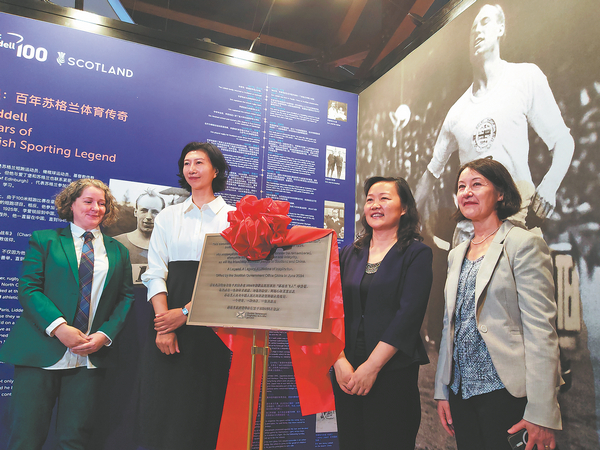

TIANJIN — In less than two weeks, the 2024 Paris Olympic Games will officially open, marking the return of the Games to Paris after a century.
The 1924 Paris Olympics was witness to a number of pioneering practices, including the introduction of the Olympic motto "Faster, Higher, Stronger" and the Olympic Village. Meanwhile, several legendary athletes emerged, among them Finland's Paavo Nurmi, who won an unprecedented five gold medals.
For China, the biggest star of the 1924 Paris Olympics might be a British Olympic champion. Not for his world-record winning performance in the 400 meters, nor for the Oscar-winning film Chariots of Fire, which was adapted from his life story, but because he was born in, died in and dedicated his life to China.
Eric Liddell is known in Chinese as Li Airui. His life story and achievements were on display at a memorial exhibition at the Tianjin Sports Museum in Tianjin municipality.
Liddell, whose parents were from Scotland, was born in Tianjin in 1902.At the age of 5, he was sent back to the United Kingdom for an education. He showed sporting talent at a young age, always ranking near the top in school running competitions, and captaining its rugby and cricket teams.
After he enrolled at the University of Edinburgh in 1920, his athletic talent became more prominent, winning many awards in national athletics competitions.
Liddell was one of the strongest contenders for the gold medal in the 100 meters at the 1924 Paris Olympics. However, the advance copy of the Olympic schedule listed the 100m and 4x100m races as being held on a Sunday. As a committed Christian, he chose not to compete in these two races and signed up instead for the 200m and 400m races, which were not his favored events and for which he had only a few months to prepare.
Despite this, he not only won the bronze medal for the 200m but broke the world record for the 400m with a time of 47.06 seconds, clinching the gold. Despite being at the peak of his sporting career, Liddell then made a surprising decision. After obtaining a degree in science, he returned to settle in Tianjin at the age of 23.
Even today, many are puzzled by his choice. Zhao Yan, a staff member at the Tianjin Sports Museum, suggests that he returned for two reasons: first, to be nearer to his family who were in Tianjin, and second, his belief that his future would be more meaningful in China. As he once said, "From birth to death, everyone seems to be on the same track, but what each person does is different, hence the meaning of life is also different."
In Tianjin, Liddell worked as a science and physical education teacher at the Anglo-Chinese Christian College. He also taught chemistry and math, trained athletes and spread the Olympic spirit. Under his tutelage, the school set up teams in soccer, basketball, baseball, table tennis, tennis and volleyball, becoming the most popular and highest-level middle school for sports in Tianjin.
Liddell is also known as the "Father of the Minyuan", then the city's most famous stadium. When it was renovated in 1925, he referenced the Stamford Bridge stadium in London to make a series of suggestions on track structure, lighting equipment and grandstand levels.